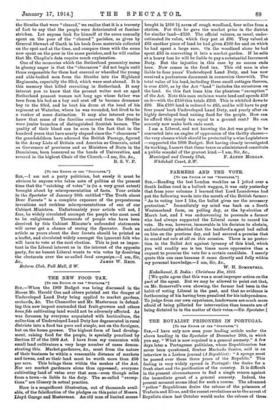THE NEW FOOD TAX.
[To TRH Eerros or rex "SPecrwrs.."]
Sin,—When the 1909 Budget was being discussed in the House Mr. Harold Cox and others pointed out the danger of Undeveloped Land Duty being applied to market gardens, orchards, for, The Chancellor and Mr. Masterman in defend. ing this new impost contended that fruit-growers and others bona fide cultivating land would not be adversely affected. As was foreseen by everyone acquainted with horticulture, the collection of Undeveloped Land Duty has degenerated in rural districts into a food tax pure and simple, not on the foreigner, but on the home grower. The highest form of land develop- ment, raising food for the people, is specially penalized by Section 17 of the 1909 Act. I have from my connexion with small land cultivators a very large number of cases demon. strating this. Market gardeners, &c., must from the nature of their business be within a reasonable distance of markets and towns, and so their land most be worth more than £50 per• acre. This brings them within the meshes of the Act. Nor are market gardeners alone thus oppressed; everyone cultivating land of value over that sum—even though miles from a town—is liable to the duty. The so-called "exemp- tions" are illusory in actual practice.
Here is a magnificent illustration, out of thousands avail- able, of the falsification of the pledges on this point of Messrs. Lloyd George and Masterman. An old man of limited means bought in 1910 if acres of rough woodland, four miles from a station. For this he gave the market price in the district for similar land—R150. The official valuers, as usual, under- estimated its value, which they put at £90. They valued at £65 another piece of land he had given £100 for and on which he had spent a large sum. On the woodland alone he had spent £53 in converting it into a market garden. if he sells at a heavy loss he will be liable to pay a substantial Increment Duty. But the injustice in this case by no means ends here. Now comes in the food tax. This old man is also liable to four years' Undeveloped Land Duty, and has now received a portentous document in connexion therewith. The total value of his land, including three small cottages thereon, is over £500, as by the Act "land " includes the structures on the land. So this fact loses him the phantom "exemption" of the Act. Note this man reclaims waste land and spends £53 on it—with the £150 this totals £203. This is whittled down to £90. His £100 land is reduced to £65, and he will have to pay four years' back Undeveloped Land Duty, and yearly after on highly developed land raising food for the people. How can he afford this yearly tax equal to a ground rentP He can scarcely now make both ends meet.
I am a Liberal, and not knowing the Act was going to be converted into an engine of oppression of the thrifty classes— the very classes which should be protected by a wise Legislature —supported the 1909 Budget. But having closely investigated its working, Iassert that these taxes as administered constitute a public scandal of the gravest kind.-1 am, Sir, &c.,










































 Previous page
Previous page